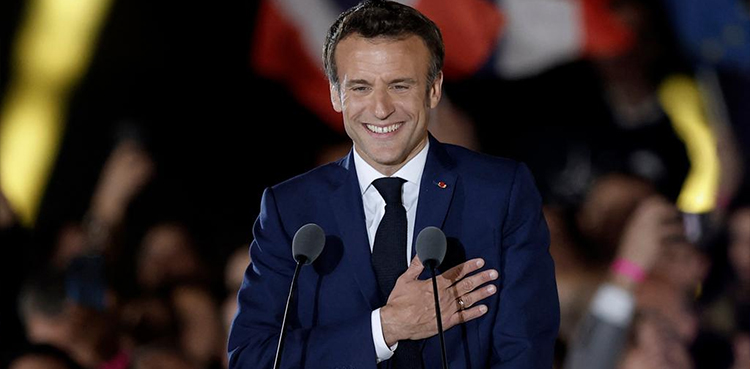
PARIS: French President Emmanuel Macron’s centrist alliance was in danger of falling short of a majority after a first round of parliamentary elections on Sunday that saw a surge in support for a new leftwing coalition.
Macron’s “Ensemble” (Together) alliance ran neck-and-neck with new leftwing coalition NUPES in Sunday’s first round, with both scoring around 25-26 percent of the popular vote.
Extrapolating from these figures, polling firms projected that Ensemble would win 225-310 seats in the second round of voting next Sunday, possibly short of a majority of 289 but comfortably the biggest party.
“We have a week ahead of us to mobilise,” Prime Minister Elisabeth Borne told reporters. “One week to convince, one week to obtain a powerful and clear majority.”
She said that Ensemble “was the only political grouping capable of getting a majority.”
NUPES, a newly unified leftwing alliance of leftists, Socialists, Greens and Communists, was seen as winning 150-220 seats, a major breakthrough that would make them the biggest opposition force in the National Assembly.
“It’s a very serious warning that has been sent to Emmanuel Macron,” political scientist Brice Teinturier told France 2 television, noting how support for the president’s party had fallen since the last election in 2017.
“A majority is far from certain,” he added.
If Macron’s coalition does fall short, it is expected to lead to messy bill-by-bill deals with right-wing parties in parliament, or he would have to try to poach opposition or independent MPs to his side.
Under France’s constitution, the president has exclusive control over foreign and defence policy, but needs a majority in parliament to pass domestic legislation.
‘First test’
Sunday’s vote followed presidential elections in April in which Macron secured a second term, beating far-right leader Marine Le Pen with pledges to cut taxes, reform welfare and raise the retirement age to 65 for most people.
After a dismal performance in that vote, the French left has united behind Jean-Luc Melenchon, a hard-left veteran who has a radically different programme, including lowering the retirement age, hiking the minimum wage by 15 percent and creating wealth taxes.
“The NUPES has passed the first test it faced in magnificent fashion,” Melenchon told reporters in a statement afterwards, calling on supporters to “pour out” next Sunday.
He called for support in particular from the working classes — “who have had 30 years of neo-liberalism crash against them” — and said voters had a chance to choose “a future of harmony, rid of social, cultural and gender domination.”
Overall turnout was projected to be a record low of 47-47.5 percent on Sunday, according to polling firms, with abstentionism particularly high in working-class areas.
Le Pen looked certain to be re-elected as an MP representing a former mining town of northern France, Henin-Beaumont, with her National Rally party appearing on course to increase their representation.
After winning 18.5-19.7 percent of the popular vote on Sunday, it was on course for 5-45 seats in the new parliament, compared with eight currently, with the wide range reflecting uncertainty about the outcome.
More than 15 MPs would give the far right a formal group in parliament, giving it more time to speak and put issues on the agenda as well as extra resources.
Le Pen’s new rival on the far right, former TV pundit Eric Zemmour, was eliminated on Sunday after standing in a constituency around Saint-Tropez in southern France.
While Macron and his European Union allies breathed a heavy sigh of relief after his victory against Le Pen in April, the last weeks have offered no honeymoon for the 44-year-old head of state.
Energy and food prices are soaring in France as elsewhere in Europe, while disorder and the tear-gassing of English fans at the Champions League final in Paris damaged France’s image abroad.
His new Disabilities Minister Damien Abad has also faced two rape accusations — which he has vehemently denied — while new Prime Minister Borne has yet to make an impact.
Macron has made clear that ministers who are standing in the election — including Borne, who arrived on top Sunday in her first attempt at winning a seat — will have to step down if they lose.
Europe Minister Clement Beaune, a close ally of Macron and a crucial influence over France’s Brexit and wider EU policies, is also standing in his first election and is seen as in a close fight with a left-wing rival.
from International News Today - Breaking News, US News, World News https://ift.tt/ol2Am3u


0 Comments